How to Use Lighting for Meditation Garden Ambiance
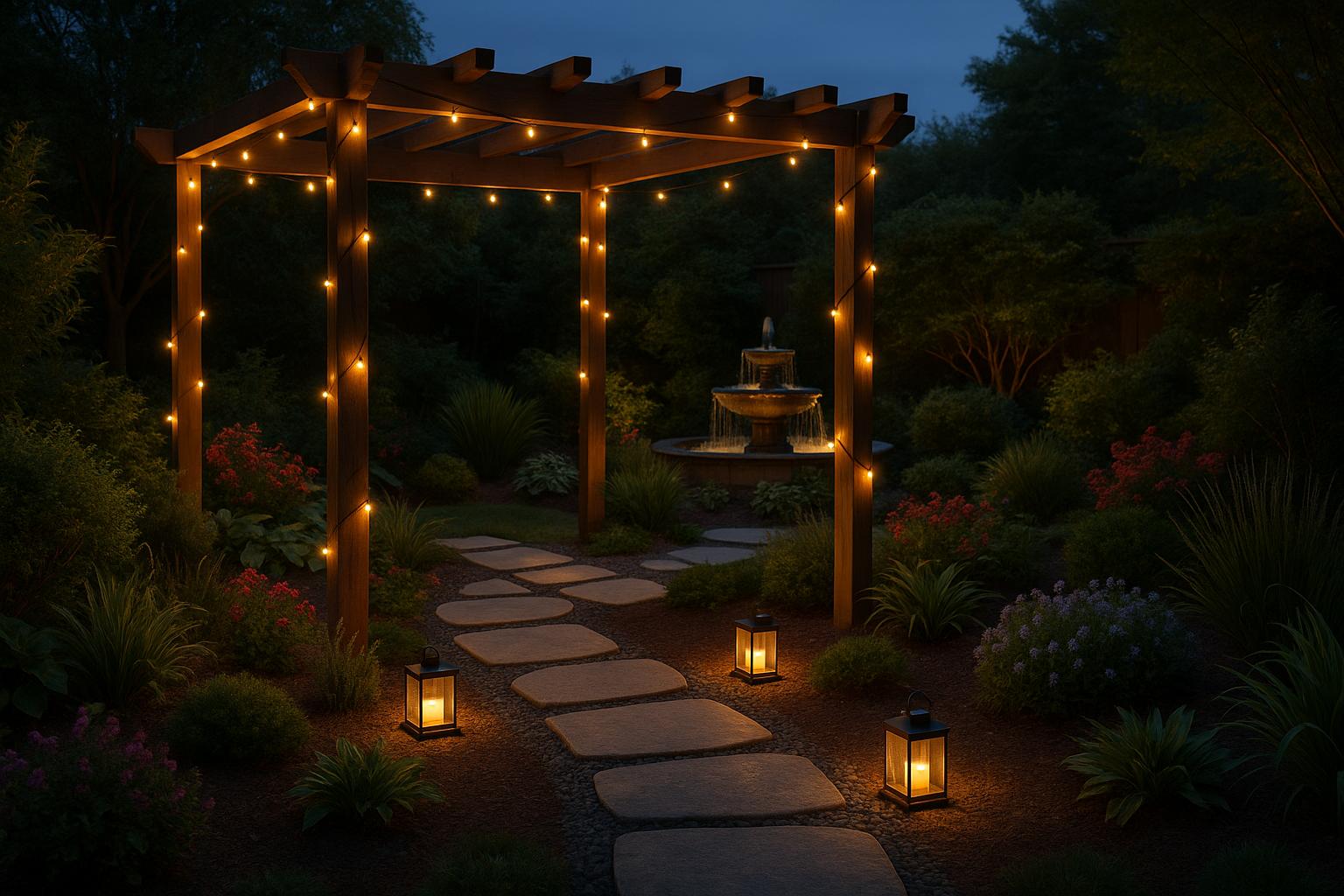
Creating a serene meditation garden isn’t just about plants and seating - it’s about lighting that promotes relaxation and safety. The right lighting can transform your outdoor space, extending its use into the evening while maintaining a peaceful atmosphere. Here’s what you need to know:
- Soft, warm lighting (2,700K–3,000K) is ideal for relaxation, mimicking natural light like sunsets or candlelight.
- Avoid harsh, bright lights that may cause distractions or anxiety.
- Use recessed path lights for safe navigation without glare.
- Lanterns, string lights, and uplighting create ambiance and highlight garden features.
- Incorporate dimmers and timers for adjustable brightness and energy efficiency.
- Consider durable, weather-resistant fixtures like IP65-rated LEDs for year-round use.
For a modern approach, tools like AIGardenPlanner can help visualize lighting layouts tailored to your garden’s layout and climate. Thoughtful lighting choices can make your meditation garden a tranquil retreat, day or night.
The Dark Art of Light Series | Episode 5: How to light your garden

How Lighting Affects Garden Mood
Lighting has a powerful impact on mood and can transform a garden into a peaceful retreat for meditation. The intensity of light plays a key role in shaping emotional responses. Soft, gentle lighting encourages relaxation, signaling it’s time to unwind and creating a serene atmosphere. This sets the stage for exploring how specific lighting techniques can enhance your meditation experience.
The quality of light matters just as much. Harsh shadows or glaring lights can disrupt focus, while soft, even illumination helps minimize distractions, fostering a sense of calm and comfort.
Soft Lighting for Better Meditation
Soft, diffused lighting is essential for creating a meditation-friendly garden. This type of light mimics nature’s most calming moments - like the golden glow before sunset or the gentle light of dawn.
By eliminating harsh shadows and bright glares, soft lighting allows the mind to settle more easily [2][3][4]. Harsh or overly intense lighting can pull your attention away from meditation, making it harder to focus. Instead, the goal is to create a space where the lighting complements your practice, offering a sense of warmth and security.
For meditation, lighting should be subtle yet functional - bright enough to move around safely but gentle enough to maintain a tranquil vibe [2]. Look for fixtures and bulbs that cast a warm, even glow across your garden. This type of lighting supports practices like meditative yoga or walking meditation by encouraging deep introspection and reducing external distractions [4].
To achieve this ambiance, consider using lamps, string lights, or candles to produce a soft, inviting glow [3]. Installing dimmer switches gives you control over brightness, allowing you to adjust the light intensity to suit your mood or the time of day [3][4][5]. Once the foundation of soft lighting is in place, you can further enhance the mood by focusing on light color and temperature.
Light Color and Temperature Effects
The color and temperature of light - ranging from warm (2,700K–3,000K) to cool (5,000K–6,500K) - play a major role in shaping the ambiance of your meditation garden. Each range has unique psychological effects.
Warm tones, such as yellow and orange, create a comforting and grounded atmosphere, reminiscent of candlelight or a sunset. These colors help ease tension and promote a sense of security, making them ideal for meditation spaces.
Cool tones, like blue and green, are linked to calmness and mental clarity. However, they should be used sparingly and paired with warmer hues to avoid creating a space that feels too sterile or uninviting. Striking the right balance between warm and cool tones adds depth to your garden while maintaining a soothing environment.
Most meditation gardens rely on warm lighting as the primary layer (2,700K–3,000K), with subtle cool accents to highlight specific features like plants or water elements. Specialty bulbs or colored filters can help achieve this effect, adding visual interest without disrupting the tranquil mood.
Natural light also plays a crucial role in setting the tone. Positioning your meditation area near a window with light, airy curtains can diffuse sunlight, creating a soft, natural glow [3]. This combination of natural and ambient lighting enhances the beauty of your garden while keeping the focus on cultivating a peaceful meditation space [5].
Selecting Meditation Garden Lights
Choose lighting that strikes a balance between function and tranquility to create a relaxing atmosphere all year round.
Light Fixture Types for Calm Spaces
LED floor lamps are a great option for outdoor meditation areas because they’re energy-efficient, long-lasting, and built to handle the elements. Yichun from Glow Furniture Factory explains, "LED floor lamps are a good choice for outdoor meditation spaces. They use little energy and last a long time. Many LED lamps are made to work in rain and wet weather, so you don't need to fear damage" [6].
Some popular LED designs to consider include:
- LED Ball and Column Combination: Offers a sculptural, glowing effect.
- LED Mushroom Floor Lamp Outdoor: Blends naturally with your garden’s organic feel.
- Outdoor Water Drop Floor Lamp: Adds an elegant, diffused glow.
- LED Outdoor Flared Shade Floor Lamp: Minimizes glare for a softer ambiance [6].
Lanterns and sconces are another versatile choice, providing both ambient light and decorative flair. They can be mounted on walls, posts, or even hung from tree branches. Opt for frosted or fabric shades to maintain a soft, diffused glow [1].
For guiding movement through your garden, recessed path lights are ideal. They enhance safety without being intrusive, making them perfect for marking transitions between different areas of your meditation space [1].
Uplighting fixtures can add depth and create focal points by illuminating trees or sculptural elements. Directing light upward through branches or architectural features adds layers of visual interest, enhancing the peaceful ambiance of your garden [1].
Once you’ve chosen your light fixtures, it’s important to focus on durability and smart control features to ensure your garden lights function reliably in all conditions.
Weather Protection and Seasonal Planning
Durability is key for outdoor lighting. Look for fixtures with an IP65 or higher rating to ensure they can withstand rain, snow, and humidity [6].
Smart controls - whether through remotes, apps, or home automation systems - offer convenience by letting you adjust lighting without interrupting your meditation. You can also set timers to automatically adjust to changing daylight hours, keeping your space perfectly lit year-round [6].
Solar-powered lights are an eco-friendly option, though their performance may vary depending on the season. For those in northern climates, hybrid systems that combine solar power with electrical backups can provide more reliable lighting during winter months [1].
Energy efficiency becomes especially important during the longer nights of winter when lights are used for extended periods. LED fixtures consume far less electricity than traditional bulbs and emit minimal heat, making them safe for surrounding plants and cost-effective for ongoing use [6].
For added versatility, choose fixtures with adjustable color temperatures. Warm tones (2,700K–3,000K) create a cozy atmosphere for winter evenings, while cooler tones are refreshing for summer nights [6].
🚀 Ready to Reinvent Your Garden?
Join thousands of homeowners who have transformed their gardens using our AI design tool. Upload one photo to explore endless possibilities.
Get your AI garden designs →Where to Place Your Garden Lights
When setting up garden lighting, the aim is to emphasize key features without overwhelming them. Thoughtful placement can highlight natural elements while preserving a calm, inviting atmosphere.
Lighting Around Garden Elements
To showcase standout features like sculptural trees or striking plants, uplighting works beautifully. Place fixtures at the base of the tree and angle them upward to highlight the trunk and canopy, bringing out their shape and texture in a subtle, elegant way [1]. For smaller plants and shrubs, tuck compact lights within the foliage for a soft, integrated glow.
Stringing fairy lights over trees, bushes, or pergolas can create a magical, sparkling effect, adding a touch of whimsy to your garden [7].
"Allow the lighting to blend in with the environment, from highlighting trees to nestled amongst the other plants." - Garden Therapy [8]
Once you've enhanced these natural elements, consider how lighting can shape spaces meant for quiet reflection.
Lighting Methods for Meditation Areas
Lighting can do more than highlight features - it can define spaces, especially those meant for meditation. Opt for soft, diffused lighting that encourages relaxation and introspection. Avoid harsh, direct lights; instead, use gentle illumination to create a serene retreat where you can unwind and connect with nature.
sbb-itb-4d6a8dd
Adjusting Light Color, Brightness, and Timing
Once you've positioned your lights, it's time to refine their settings to bring your garden's tranquil vibe to life. By tweaking light colors, brightness levels, and timing, you can create the perfect atmosphere for your outdoor sanctuary.
Light Colors for Relaxation
The color of light can dramatically influence the mood of your meditation space. Choosing the right color temperature can help set the tone you want, whether it's calm and cozy or fresh and focused.
Warm white lights (2700K–3000K) are perfect for creating a soothing, amber glow similar to candlelight or a sunset. This makes them ideal for unwinding during evening meditation sessions.
| Light Color | Temperature Range | Best For | Mood Effect |
|---|---|---|---|
| Warm White | 2700K–3000K | Evening meditation, relaxation | Calming, cozy |
| Soft White | 3000K–3500K | All-day use, general ambiance | Comfortable, welcoming |
| Cool White | 4000K–5000K | Morning meditation, focus | Refreshing, clear |
| Colored LEDs | Variable | Special occasions, seasonal themes | Flexible to your choice |
Adding colored lighting can make your space even more personal. For example, soft blue lights can promote a sense of calm, while gentle green tones evoke the refreshing feel of nature. If you're aiming for a more spiritual or reflective atmosphere, purple or lavender hues can create a serene and contemplative environment.
Now, let’s look at how technology can make managing these lighting effects effortless.
Setting Up Timers and Dimmers
Automated lighting systems are a game-changer for creating the perfect ambiance. Smart timers can mimic natural transitions, such as gradually dimming lights to simulate a sunset.
Dimmers and timers allow you to fine-tune brightness and color temperature based on the time of day or season. For instance, during the long summer evenings, brighter lights can extend your garden's usability. In contrast, winter calls for softer, warmer lighting earlier in the evening to create a cozy retreat.
Modern LED systems often come with smartphone apps that let you control brightness, from a gentle glow to a more vibrant light. For pathways, motion sensors with adjustable timers are a practical choice. These sensors can activate lights at around 30% brightness when you approach and then gently dim to about 10% after 10–15 minutes of inactivity, maintaining a peaceful flow in your space.
For seasonal changes, programmable controllers can automatically adjust the color temperature of your lights. In colder months, warmer tones around 2700K can make your garden feel snug and inviting. As spring and summer arrive, shifting to cooler tones around 3500K can bring a refreshing and balanced energy to your outdoor haven.
Using AIGardenPlanner for Lighting Design
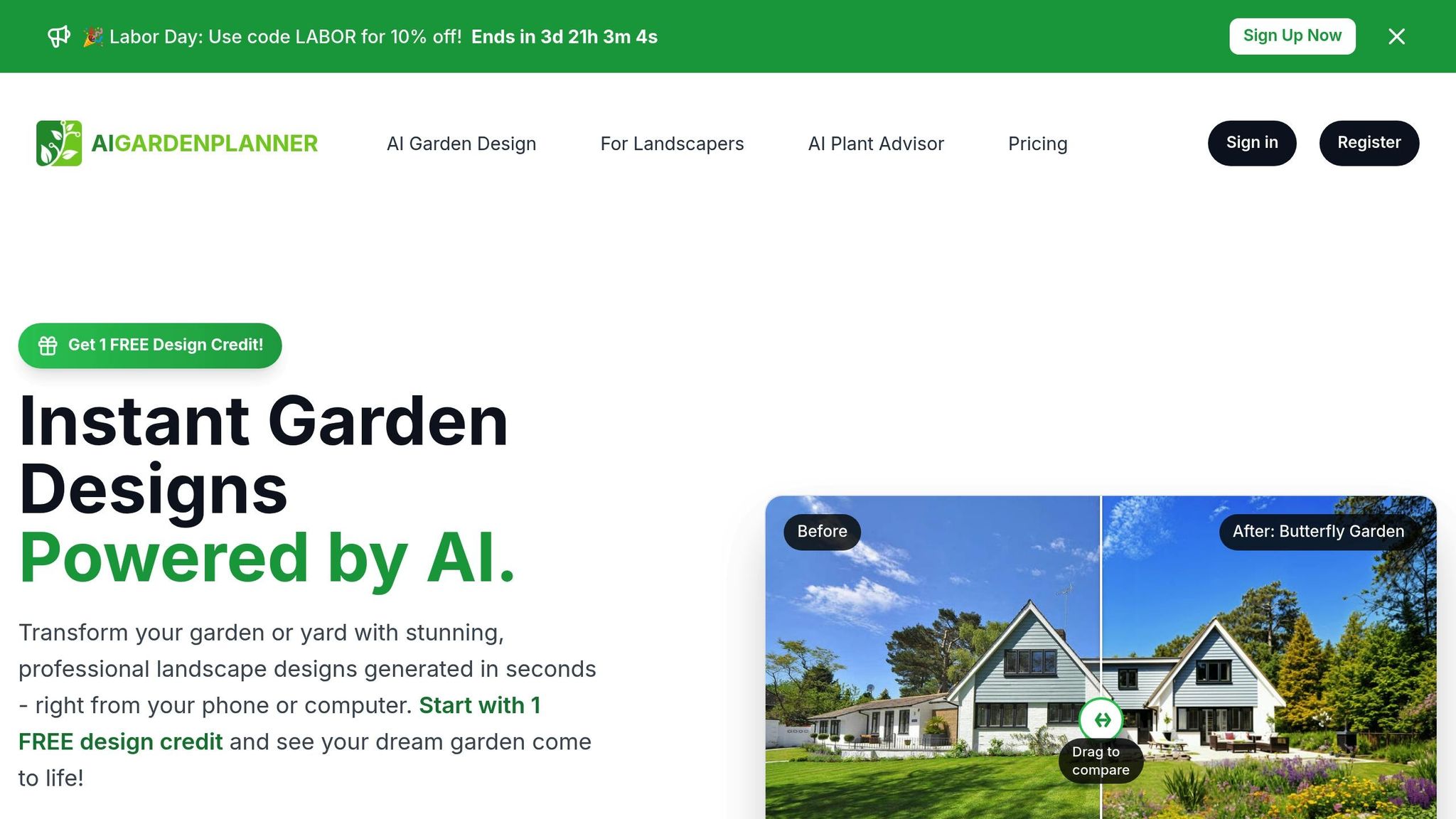
When it comes to designing lighting for your meditation garden, visualizing the perfect setup can feel overwhelming. This is where AIGardenPlanner steps in, making the process much easier. By using this platform, you can see exactly how different lighting choices will transform your garden, taking the guesswork out of your design decisions.
The tool leverages AI to analyze photos of your existing garden and generate tailored lighting designs. Whether you're considering subtle pathway lights or accent lighting to highlight specific features, AIGardenPlanner helps you experiment with various options to create a peaceful, inviting atmosphere.
AI Lighting Layout Planning and Previews
AIGardenPlanner’s design generator offers realistic previews of how lighting will interact with your garden's elements. Simply upload a photo of your space and explore over 50 garden styles, each with unique lighting layouts and ambiance options.
Want to try out solar lanterns along a winding path or LED strips under seating areas? The platform lets you test these ideas digitally, showing how they’ll complement your plants, hardscaping, and meditation spots. For example, warm-toned uplighting can create a soft, tranquil backdrop, while ground-level lights can define meditation zones without casting harsh shadows.
The AI also factors in your garden's size, existing structures, and natural features to suggest layouts. For a small courtyard, it might recommend minimalist wall-mounted fixtures to maintain an open feel. In contrast, larger spaces could benefit from a layered approach, combining pathway lights, accent fixtures, and ambient lighting. These detailed previews align seamlessly with the overall design strategies discussed earlier.
Matching Lights with Plants and Climate
AIGardenPlanner takes it a step further by integrating its AI Plant Advisor into the lighting design process. This tool analyzes your local climate, soil type, and weather patterns to recommend plants that thrive in your area. But it doesn’t stop there - it also ensures your lighting choices are compatible with your environment and plant selections.
For instance, in areas prone to extreme weather, the tool might suggest durable fixtures that can withstand harsh conditions. It also demonstrates how uplighting can beautifully highlight climbing or flowering plants, while low-level lights can enhance ground textures during evening hours. This thoughtful integration ensures your lighting not only complements your garden’s aesthetics but also supports plant health, creating a serene and balanced space.
AIGardenPlanner makes professional-quality lighting design accessible with flexible pricing options. Casual users can opt for the Pay As You Go plan at $15, while those seeking ongoing access can choose the Starter plan at $19/month (or $9/month when billed yearly). Both plans include access to the AI Plant Advisor and design tools, making it easier than ever to create your ideal garden lighting setup.
Conclusion
Creating the perfect lighting for your meditation garden is all about crafting an atmosphere that nurtures relaxation and allows you to enjoy the space well into the evening. Let’s tie together the practical tips shared earlier with your vision for a serene retreat.
Soft, warm lighting is your ally in fostering calm and tranquility. Harsh, glaring lights can disrupt the peaceful vibe, while gentle illumination soothes the mind and encourages relaxation. The goal is to strike a balance - enough light for safety and functionality without overwhelming your senses.
Where you place your lights plays a huge role in shaping the mood of your garden. Recessed path lights are a smart choice for safely guiding movement without causing glare, and uplighting can highlight your favorite plants or garden features in a subtle, elegant way - without casting distracting shadows in your meditation zone.
Using dimmers and timers is another game-changer. They let you tweak the brightness to match your needs, whether you’re diving into deep meditation or enjoying a quiet moment with a book.
To bring your vision to life, consider leveraging modern tools like AIGardenPlanner. This platform uses AI to help you visualize how different lighting fixtures and placements will transform your space. It even takes into account your local climate, existing plants, and garden layout to recommend solutions that harmonize with your environment - making it easier to design a peaceful sanctuary.
Your meditation garden should be a haven where you can escape daily stress and reconnect with yourself. Thoughtfully planned lighting can make all the difference, creating a warm and inviting space that draws you outside, even after the sun goes down, to extend those precious moments of peace into the night.
🎨 Visualize Your Dream Garden Today!
Transform any outdoor space into a professional landscape design in minutes. Just upload a photo, choose your style, and let our AI do the rest.
Start your garden transformation now →FAQs
What are the advantages of using dimmers and timers for lighting in a meditation garden?
Using dimmers and timers in your meditation garden lighting setup can transform the space while offering practical perks. With dimmers, you can easily adjust the brightness to suit your mood, creating a calming ambiance that aligns with the serene nature of your garden. Plus, they help you save energy and make your light bulbs last longer, adding both convenience and cost savings.
Timers take it a step further by automating when your lights turn on and off. This hands-free approach not only ensures your garden is illuminated at the right times but also reduces energy use and wear on your lighting system. Together, dimmers and timers make it simple to design a tranquil, energy-smart retreat tailored to your relaxation needs.
How can I create energy-efficient and weatherproof lighting for my meditation garden?
To create lighting in your meditation garden that's both energy-efficient and built to handle the elements, opt for LED or solar-powered lights. These options consume less energy and are specifically designed for outdoor use. Be sure to select fixtures with a waterproof rating of IP65 or higher - this ensures they can hold up against rain, wind, and fluctuating temperatures.
To make them even more durable, install the lights securely and use weatherproof covers for extra protection against harsh weather. These simple measures will help you maintain a peaceful, eco-conscious atmosphere in your meditation space.
How does light color and temperature impact the atmosphere of a meditation garden?
Lighting plays an essential role in setting the mood of a meditation garden. Warm white lights, typically ranging from 2700K to 3000K on the color temperature scale, emit a gentle, golden glow. This type of lighting fosters relaxation and creates a calming atmosphere - just right for meditation. In contrast, cooler white lights with temperatures above 4000K offer a brighter, more energizing effect, which might feel out of place in a peaceful setting.
To cultivate a tranquil and welcoming environment, stick with warm-toned lighting. It enhances the garden's sense of serenity, making it a perfect space for mindfulness and quiet reflection.
Related posts
Related Articles
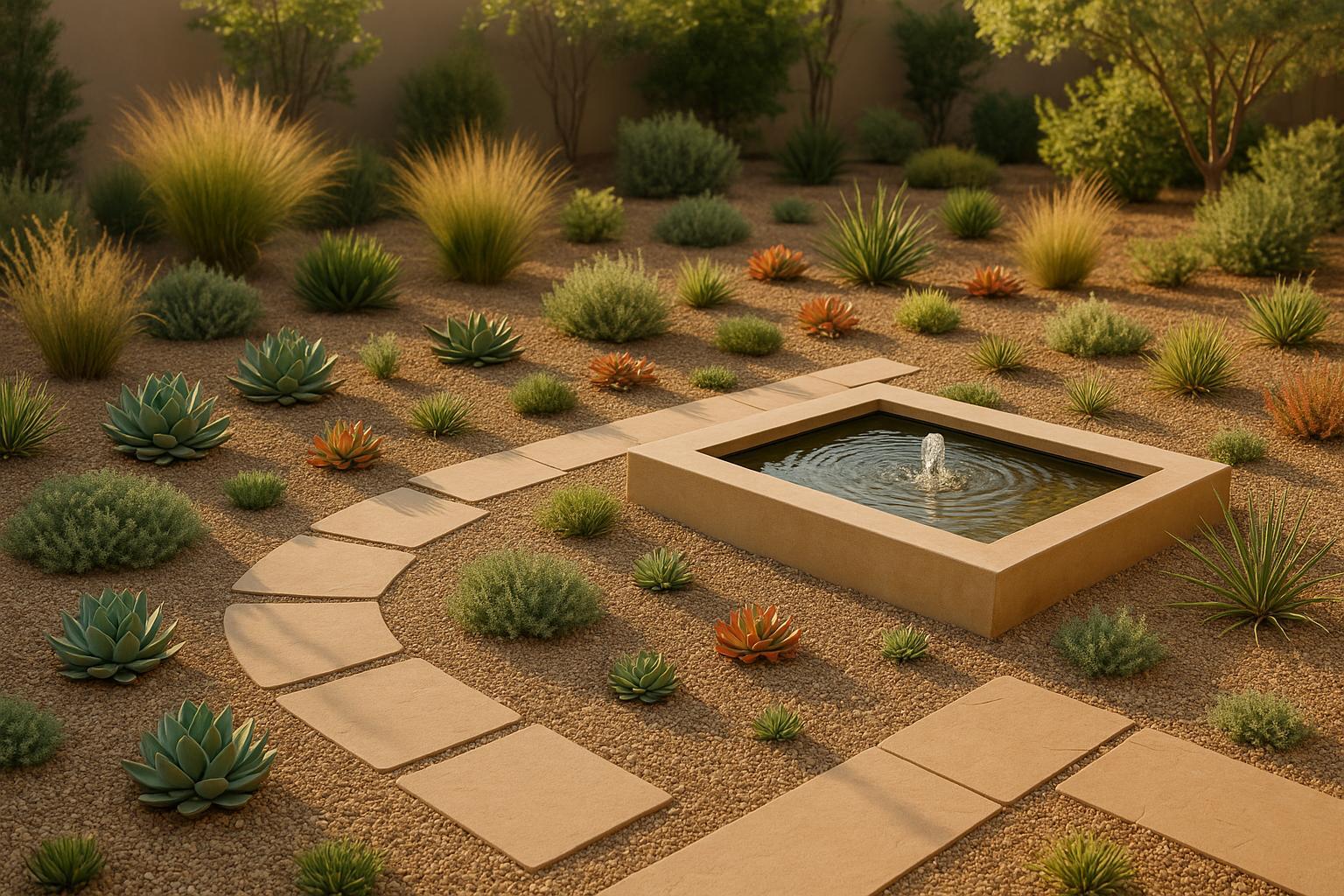
5 AI Tools for Energy-Efficient Garden Design
Explore innovative AI tools that simplify energy-efficient garden design, focusing on water conservation and climate adaptation for sustainable landscapes.
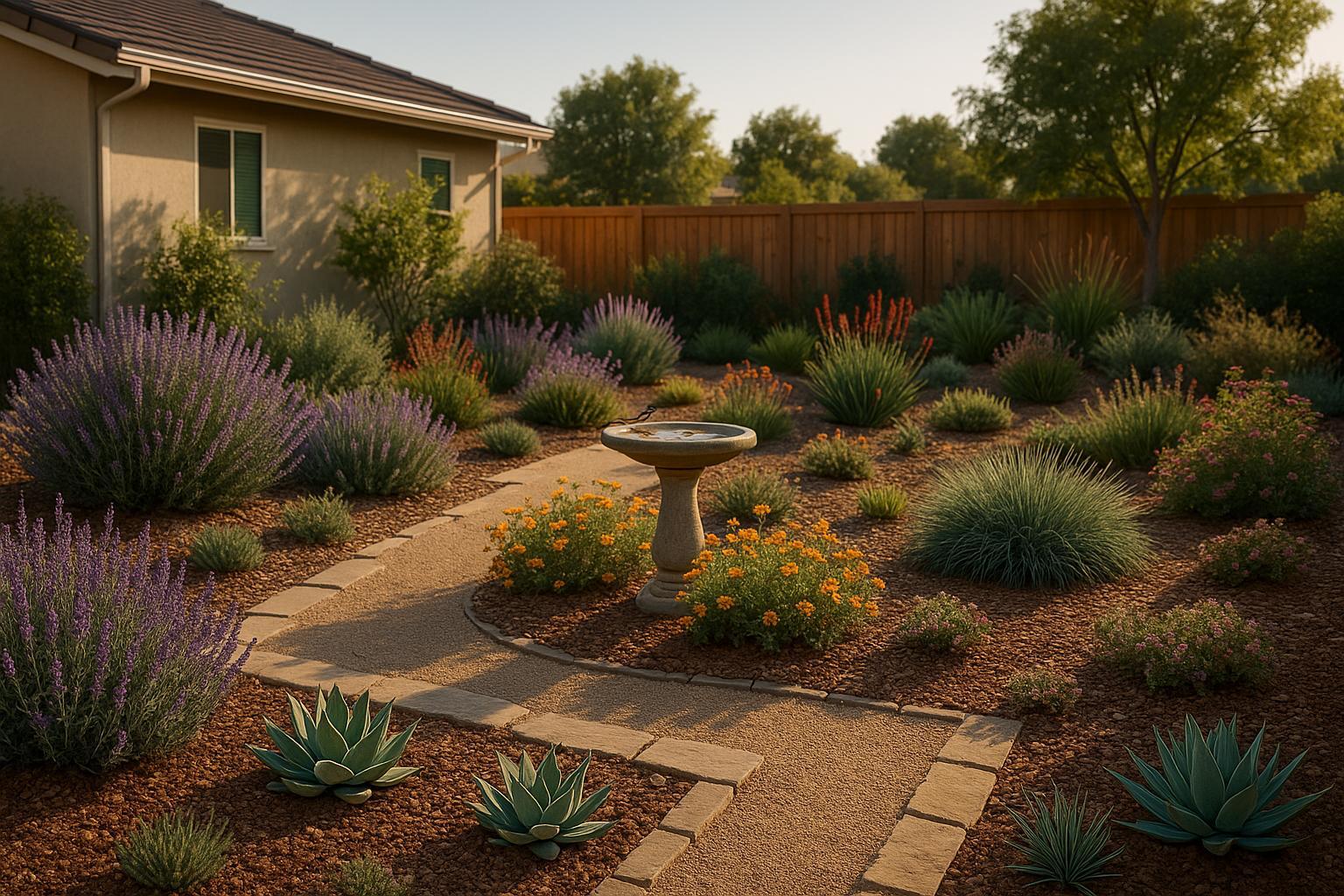
5 Steps to Create a Low-Water Garden
Transform your outdoor space with a low-water garden using simple steps that save money, reduce maintenance, and support ecosystems.
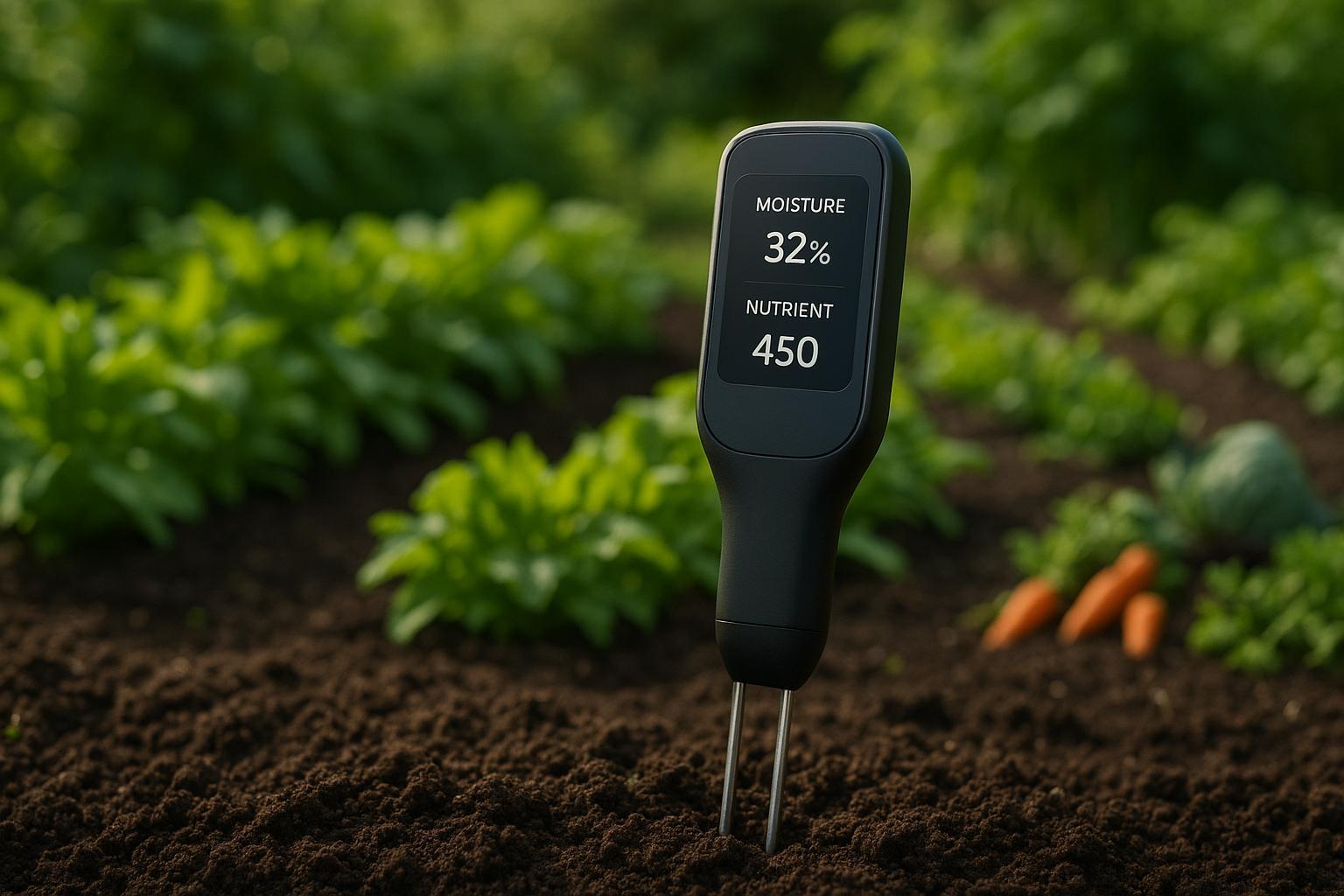
Top 7 Soil Sensors for Moisture and Nutrient Tracking
Explore the top soil sensors for monitoring moisture and nutrients, enhancing your gardening efficiency and plant health.
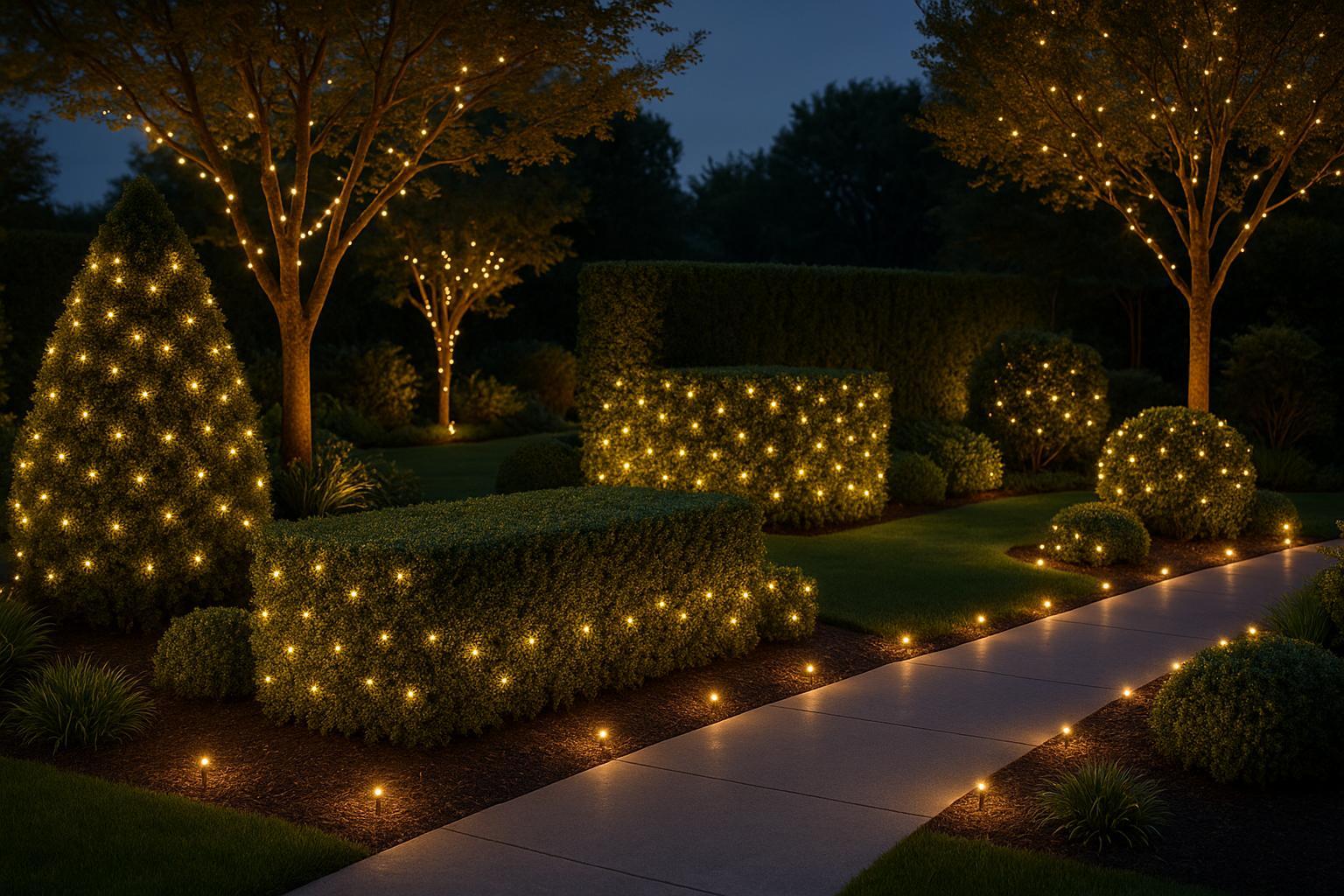
AI Holiday Lighting for Landscapers
Explore how AI is revolutionizing holiday lighting for landscapers, enhancing design efficiency, customization, and client satisfaction.
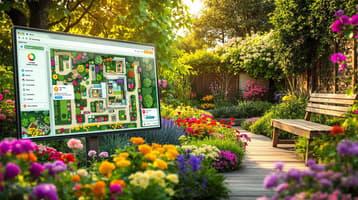
AI Garden Design vs. Traditional Methods
Explore how AI garden design tools outperform traditional methods in speed, customization, and ease of use for both amateurs and professionals.

How Multi-Sensor Systems Detect Plant Diseases
Explore how multi-sensor systems revolutionize plant disease detection with advanced technology, offering early insights and precise treatment strategies.